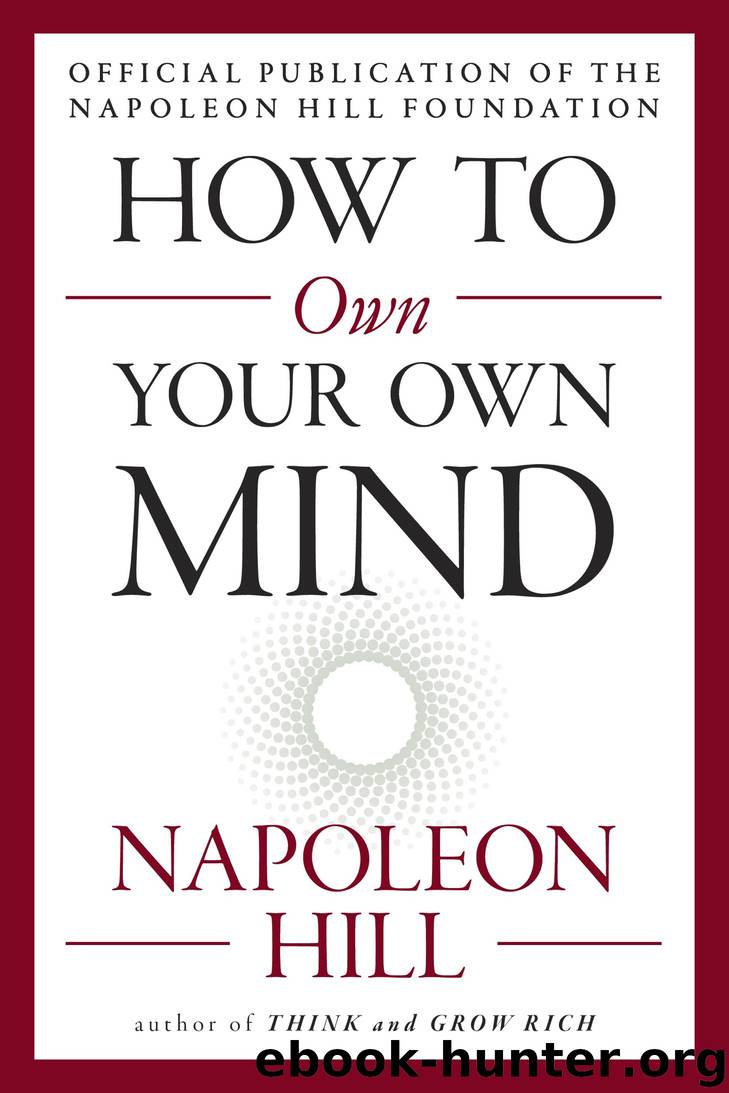How to Own Your Own Mind by Napoleon Hill

Author:Napoleon Hill
Language: eng
Format: epub, azw3
Publisher: Penguin Publishing Group
Published: 2017-09-19T04:00:00+00:00
Andrew Carnegie’s Views on Organized Thinking
THIS INTERVIEW TOOK place in Mr. Carnegie’s private study, more than thirty years ago, while the great steel master was coaching his protégé, Napoleon Hill, in preparation for the organization of the Philosophy of American Achievement.
HILL:
You have explained that an important principle of individual achievement is Organized Thought. You have stated, also, that no one may be sure of success without the ability to organize his thinking habits. Therefore, will you go ahead, Mr. Carnegie, and explain the meaning of the term “organized thought”? I have a general idea what it means, but I would like to have a detailed statement of its meaning—also a clear understanding of how this principle is applied in the practical affairs of life.
CARNEGIE:
Before discussing the organization of thought, let us examine thought itself. What is thought? With what do we think? Is thought subject to individual control?
Thought is a form of energy that is distributed through the brain, but it has one peculiar quality unknown in connection with all other forms of energy; it has intelligence!
Thought can be controlled and directed toward the attainment of anything man may desire. In fact thought is the only thing over which any person has complete, unchallenged control. The system of control is so complete that no one may penetrate the mind of another without his consent, although this system of protection often is so loosely guarded that one’s mind may be entered at will by any person skilled in the art of thought interpretation. Many people not only leave their minds wide open for others to enter and interpret their thoughts, but they voluntarily disclose the nature of their thoughts by unguarded expressions of speech and their personal conduct, their facial expression, and the like.
HILL:
Is it safe for one to leave his mind open to free entry by others?
CARNEGIE:
Just about as safe as leaving the door to one’s house unlocked, with all of one’s valuables left inside the house, except that the loss of purely material things is as nothing compared with the loss one may suffer by leaving his mind open to entry by any stray tramp who may wish to go in and take possession.
You see, the habit of leaving one’s mind open and unguarded not only permits other people to enter and become familiar with one’s most private thoughts, but this habit permits all sorts of “tramp” thoughts, released from the minds of others, to enter one’s mind.
HILL:
You believe, then, that thoughts do pass from one mind to another.
CARNEGIE:
Yes, one’s mind is being constantly bombarded with the impulses of thought released from the minds of others—especially those with whom we come into close contact daily. One negative-minded workman, if left to associate with other workmen, will pass on his negative thoughts to every other person within the range of his influence, although he never speaks a word or makes a single move indicating his state of mind. I have seen this very thing happen so often that I could not be mistaken about it.
Download
This site does not store any files on its server. We only index and link to content provided by other sites. Please contact the content providers to delete copyright contents if any and email us, we'll remove relevant links or contents immediately.
Goodbye, Things by Fumio Sasaki(8247)
The Road Less Traveled by M. Scott Peck(7228)
Daring Greatly by Brene Brown(6189)
Big Magic: Creative Living Beyond Fear by Elizabeth Gilbert(5299)
Grit by Angela Duckworth(5261)
Discipline Equals Freedom by Jocko Willink(5133)
The Wisdom of Sundays by Oprah Winfrey(4932)
Ego Is the Enemy by Ryan Holiday(4888)
The Laws of Human Nature by Robert Greene(4724)
You Are a Badass at Making Money by Jen Sincero(4631)
Influence: The Psychology of Persuasion by Robert B. Cialdini(4571)
The Miracle Morning by Hal Elrod(4391)
Rising Strong by Brene Brown(4169)
Reflections Of A Man by Mr. Amari Soul(4097)
A Simplified Life by Emily Ley(3943)
The Power of Positive Thinking by Norman Vincent Peale(3824)
Seriously... I'm Kidding by Ellen DeGeneres(3387)
How to Win Friends and Influence People in the Digital Age by Dale Carnegie & Associates(3332)
Delivering Happiness by Tony Hsieh(3255)
